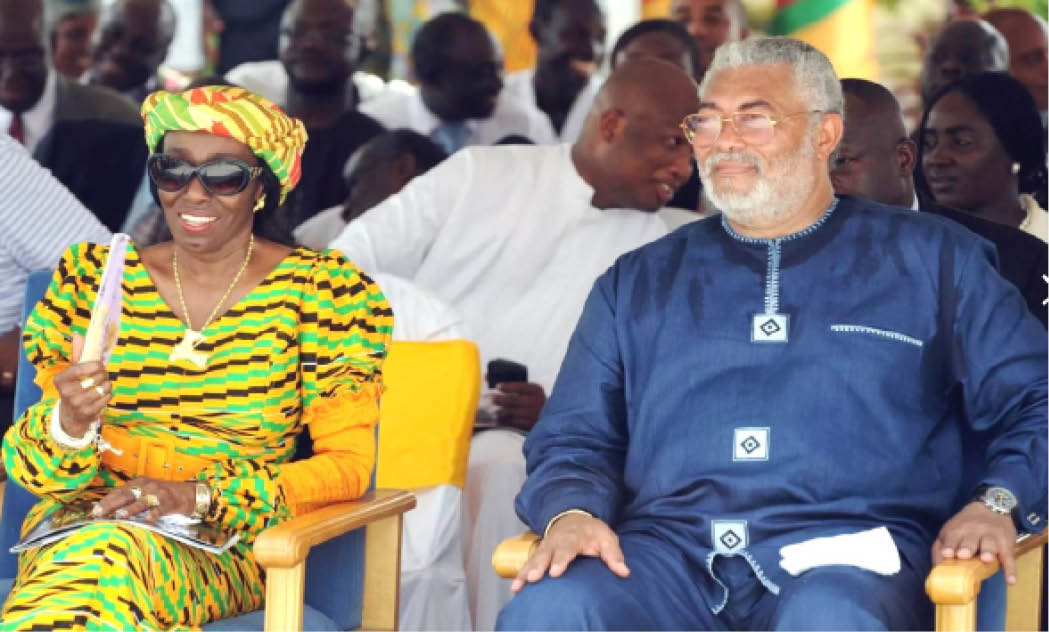Column No. 6: Rawlings, IBB, OBJ, Buhari and an unforgettable encounter
Sometime in January of 2008, when I was editor of the Weekly Trust (currently called Daily Trust Saturday), I got the opportunity of a lifetime, to interview Flt Lt Jerry John Rawlings. Our parent company, Media Trust, hosts annual dialogues featuring stellar guest lists, and that year the Ghanaian icon was on it. Led by […]

Sometime in January of 2008, when I was editor of the Weekly Trust (currently called Daily Trust Saturday), I got the opportunity of a lifetime, to interview Flt Lt Jerry John Rawlings. Our parent company, Media Trust, hosts annual dialogues featuring stellar guest lists, and that year the Ghanaian icon was on it. Led by then editor-in-chief Mannir Dan-Ali and Editorial Board Chairman Ishaq Modibbo Kawu, and along with then head of our investigations desk Theophilus Abbah, we arrived at the door of Rawlings’ suite at the Transcorp Hilton, Abuja. We knocked, and his beautiful wife Nana answered, with a warm smile.
After the introductions, and a bit of a chat (Kawu is a huge Africa buff with acres of deep and wide knowledge on the continent and its politics), we got down to the interview proper. Topics covered included his relationships with Nigerian leaders, politics, abuse of democracy in Africa, as well as how things have spiraled downwards globally as a result of a unipolar system, and of course many others. His take on Nigerian leaders was almost as funny as it was interesting. For instance, when asked about retired General Ibrahim Badamasi Babangida, he simply mumbled inaudibly, before saying: “I think some truths are better not spoken out.”
On the current Nigerian president, Rawlings said: “Buhari was a fine man. But he had some funny characters around him.” Asked about another retired general, Olusegun Obasanjo, and why they aren’t good friends, he smiled wryly, and answered: “He knows why.”
Rawlings, throughout the interview, exhibited a kind of graciousness that could only possibly come from a man who remains sure about the decisions that have shaped his career, both on the African continent, and on the global stage. But still, he refused to agree that Ghana’s revolutionary era had more than its fair share of mistakes. As an interview subject, however, he was no disappointment. He spoke with candour, wit, and an incredible memory, oftentimes assisted by the ever-present Nana. Several times, she literally finished his sentences for him, underscoring the fact that theirs was a relationship buffered by a solid bond.
Speaking of his wife, Nana, she was very present during the interview, as much as before and after. She, like her husband, was very calm and direct, yet full of warmth, even when potentially uncomfortable questions were asked. And we did ask uncomfortable questions, and Rawlings – sometimes with brilliant assists from his wife – answered every single one. After hours, which didn’t feel even close to that long, we rounded up the chat and turned off our recorders. Then the unofficial conversations began, resulting in a number of compelling stories that can’t possibly fit here, or even a whole page. It was a true fly-on-the-wall moment for me.
At a point, Mrs. Rawlings pointed out to her husband, that I looked very much like him. He regarded me keenly for some seconds and laughed, disagreeing with her. Now, the truth is that I spent a good deal of my young adulthood being told how much I look like the man. In fact, that is how I first became aware of the existence of a man called Rawlings, when politics-savvy uncles and big brothers come home from university, regaling us with stories of Africa’s heroes.
Topics exhausted, jokes spent, and banter finished, we got up and made to leave. Our hosts both walked us to the door, and before Mrs. Rawlings could open it, there was a knock from the other side. She opened it, and there stood retired general, Abdulsalami Abubakar, smiling. He had come to visit his old friends. After handshakes and greetings, we took a group photo (which I still have, and which I won’t ever share), and we were on our way. The interview, of course, was well-received and we got a lot of reader mail for it.
After the interview, and the Trust Dialogue the next day, I only ever read stories about Rawlings here and there. There was a viral video too, which showed him angrily confronting unruly Ghanaians in a traffic jam, as well as other odds and ends. But nevertheless, news of his death hit me like that of a man I knew very well. But I guess, in a way, within the three hours-plus I spent in his company those many years ago, he opened up sufficiently for us to know him enough. Enough for me to feel a great sadness at his passing, and at Africa’s loss. Godspeed, sir.
Postscript: The above article contains portions of an interview with JJ Rawlings, excerpted from the Daily Trust Sunday edition of January 20, 2008. Any reader interested in a PDF of the original interview in its entirety can shoot an email to [email protected], and I will gladly share.
